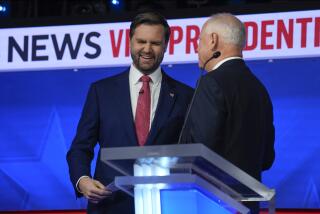Rivals Sharply Challenge Dukakis in Iowa Debate
- Share via
DES MOINES — Massachusetts Gov. Michael S. Dukakis, reputed front-runner in the 1988 Democratic presidential race, was sharply challenged by several of his rivals at a campaign debate here Sunday.
Tennessee Sen. Albert Gore Jr. was Dukakis’ most aggressive critic, repeatedly taking the governor to task for not being specific enough during the debate on economic policy. The encounter was carried live on public television throughout this state where the Democratic delegate selection process begins next February and it was broadcast nationally on cable by C-SPAN.
Indeed, Gore provoked hoots of derision from some in the crowd of about 1,000 at the Iowa State Fair Grounds, apparently because they regarded his tactics as heavy-handed. And at one point, Missouri Rep. Richard A. Gephardt asked Gore: “If I get to 52% in the polls in New Hampshire will you start attacking me like you have Michael Dukakis today?”
But in fact, Gephardt himself, along with Delaware Sen. Joseph R. Biden Jr. and Illinois Sen. Paul Simon, also pointedly disputed either Dukakis’ proposed solutions to national problems or his claims to having forged an “economic miracle” in Massachusetts, a contention that is at the heart of his candidacy.
None of the exchanges were heated or angry. And Dukakis sought to take the sting out of the confrontation by appearing good-natured in his response, once even leaning over to shake Gore’s hand.
But the comments of Dukakis’ rivals, particularly Gore, were far more direct than any criticism heard in a nationally televised debate in Houston last month. If nothing else, the increased combativeness served to enliven a two-hour session in which the seven Democratic candidates, including former Arizona Gov. Bruce Babbitt and the Rev. Jesse Jackson, mostly reiterated previous positions in answering questions from a panel of news broadcasters and from each other.
More significantly, the needling of Dukakis represented a sort of grudging tribute to the Massachusetts governor’s early success in winning attention and support not only in neighboring New Hampshire but around the country. It reflected what one Gephardt aide called “the sense of frustration” among the other candidates at Dukakis’ emphasis on his record in Massachusetts, where--as the governor pointed out during the debate--the latest monthly figures show that unemployment has dropped to 2.5%
Gore Quick to Reply
Gore went after Dukakis almost immediately. After the Massachusetts governor responded to the first question from the panel on boosting farm exports by suggesting easing farm credit, “a balanced program of supply management” and developing new uses such as gasohol for crops, Gore said: “The problem with what Gov. Dukakis has said is that it contains no specifics whatsoever.”
Gore then ticked off some proposals of his own, including taking more environmentally sensitive land out of production, expanding agriculture extension service programs and negotiating international agreements for trade in various commodities.
Gephardt joined in the sniping. He responded to Dukakis’ claims for Massachusetts by asserting that the nation needs a President with a national rather than a regional view.
Biden Questions Remedy
Biden questioned whether the remedy of economic diversification advanced by Dukakis would work as well in the Midwest as it might in Massachusetts with its base of higher education and high technology.
“It’s not like diversification back East,” Biden said of conditions in the Midwest. “When the next nearest small town is 30 miles away and there’s no major university, you don’t get people to relocate there.”
Simon also sought to undercut Dukakis’ claims to achievement in Massachusetts, which critics say owes a good part of its prosperity to increased defense spending under the Reagan Administration.
Given the opportunity to question Dukakis directly, Simon referred to the 59% increase in defense spending under Reagan as “a pretty healthy welfare check for the state of Massachusetts” and asked Dukakis how he would convert defense workers to other jobs.
‘Job of Next President’
Dukakis contended that only 5% of the increase in employment in his state is attributable to defense and added that such conversion is “part of the job of the next President,” using such resources as federal urban development funds.
Neither Jackson nor Babbitt joined in the sparring with Dukakis. Jackson referred to the hard times suffered by farmers and others in the Midwest as “economic violence,” which he blamed on Reagan Administration budget policies and on the greed of big corporations.
Babbitt, who has been working hard to correct the poor impression he created in the Houston debate, appeared more relaxed and forceful Sunday than in the earlier event.
Bonuses and Profit-Sharing
In his responses to questions, the former Arizona governor emphasized the economic proposals he introduced in a recent Washington address in which he called for “workplace democracy” through bonuses and profit-sharing, “a needs test” for government spending programs and a progressive national sales tax to help reduce the federal deficit.
More to Read
Get the L.A. Times Politics newsletter
Deeply reported insights into legislation, politics and policy from Sacramento, Washington and beyond. In your inbox twice per week.
You may occasionally receive promotional content from the Los Angeles Times.










